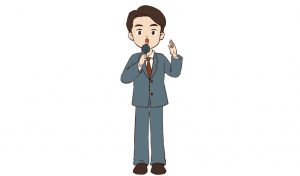How To End A Speech Presentation: The ending part of a speech is very much as important as the beginning and the body of speech. It is necessary to be intentional about not neglecting speech closure. Speech cannot be completed in isolation of any of its components. In other words, what makes a speech, a speech is the fact that its generally accepted format is wholly adhered to without reservation. So much attention is normally given to the introductory part for obvious reasons which include the fact that it would go a long way stirring up the interest of the audience towards the speech.
Same level of attention and effort is made in respect of the body of a speech for the reason that it is the substance of the speech and contains the information intended to be passed. But it seems that little or no attention is given to the conclusive part of a speech because it is generally believed that conclusion is always never a big deal.

This is purely a misconception. A speech without a good end may loose its purpose. Not just for ending sake; the enthusiasm with which the speech is begun with must be sustained up till the ending part. That is what makes a perfect speech. Having pointed out the necessity of sustaining the initial efforts up till the end of a speech, here are best ways to end a speech.
Recommended: How to start a speech perfectly well
Tips to end an interesting speech with impact, joke or quote
1. Ensure to Complete Your Speech Presentation Within The Time Alloted to you: I choose to consider this first because it is a non-negligible factor which people tend to neglect. The fact is this; whenever you run out of the time allotted to you during your speech, your conclusion bears the consequences.

Circumventing this situation from occurring is the first step to ensuring that your speech is well ended. It is better to summarize your points while presenting the body of the speech (because this seems to be the part that costs more time). And interesting fact is that summarizing or hitting on the body of your speech whenever time factor calls for it, does not frustrate you from illustrating your points better.
This is because, those points would still be implicated during your conclusion. It is at towards the end of your speech that you’d wrap up your entire points. The attention of the audience is better sustained if this technique is correctly employed. On the other note of this heading, once your time has been clearly allotted, the audience would become conscious of that. Things you say outside your time may be less compelling, no matter how resounding the points are.
And when it is on your notice that you have already gone out of your time, it makes you unstable. The point here still is that your ability to work within time is the first best way to end a speech. Whenever you run out of the time allotted to you, your conclusion bears the burden.
2. Employ a Conclusive Tone: While getting to the end of your speech, it is a formality to end with a conclusive tone. This shows that you are carrying your audience alongside your speech far way up till the conclusion. Tone is as a device helps to sustain the attention of your audience. It suggests perfect communication. You shouldn’t be found ending your speech abruptly or as a surprise.

That’s wrong. Your tone should be able to dictate or suggest the stage at which you are in your speech. Your audience should be able to predict that you are rounding off. Tone is not farfetched. It is the manner in which your speech is expressed. Trying to master a conclusive tone? Employ the appropriate intonation and articulation, be confident as to show that you understand and believe in your speech (this will make you sound convincing), employ the tone of sorrow, supplication, pity, hope, etc, where appropriate. All these put together, your tone should always suggest that you are concluding.
Also see: How to start a conversation with someone easily
3. You Can Use “in Conclusion”: This is straight. While ending your speech, you can use words which suggest the coming to an end of your speech. Words such as; in conclusion, that being the case, I choose to drop my biro by…, having said all that is necessary, in the absence of every other material point, and the host of them. Use such words only when you are sure that you’re concluding.

Remember that your audiences are flowing with you; don’t sway them into believing that you are concluding whereas you are still in the body of the speech. It is an abuse of the formality. Asides that, it can be annoying. Use conclusive clauses only when you are sure that you’re concluding.
4. End With a Summary: Having marshaled out your points while you were presenting the body of the speech, it is never enough. Your audience shouldn’t be surprised that you’ve ended. You need to wrap up all your points in a summary manner. You need to reiterate certain grave points to their hearing.
Remember that it is from the points which you’ve made at the body of your speech that your conclusion should be drawn from. Formality demands that you summarize them. Asides formalities, the audience expect and await your points to be reiterated.
Always end with a summary of your points. You know and understand your points better, and you’ve said a lot already. It is necessary to restate them towards the end of your speech in a summary manner.
Recommended: How to be a good conversationalist
5. Refer Back To Your Introduction: Towards your end, always remember where and why you started. Your introduction is the basis of your speech. It is the spike which gave rise to the totality of your speech. Your introduction is in fact the purpose of your speech. Your introduction extends to the issues which you’ve raised in your speech.

These issues are never resolved if you fail to connect the dots of the introduction and body if the speech to the conclusion. Resolving the basis of your speech makes it a successful one. And to achieve that, you must towards the end of your speech, refer back to the introduction which had identified the basis of your speech.
6. Make Use Of Rhetorical Questions: By the time you start heading to the end of your speech, certain issues must have been raised in the mind of your audience. That’s not enough. Try to put up rhetorical questions towards the end of your speech where necessary.
It is an amazing device to employ. Rhetorical questions suggest that your speech is purpose driven. Thus, it has a direction; you understand your points, the issues and the possible solutions.
Also see: Challenges facing youths in the society today and solutions
7. Proffer a Solution: Having highlighted your points, you probably must have raised certain issues in the mind of the audience. Don’t leave them unattended to. Relax their mind by suggesting a solution. Your solutions must be credible, verified and realistic. It shouldn’t be such that will raise more questions in the mind of the audience.

8. Call Your Audience to Action: Having suggested solutions, you must make a point towards its enforcement. This is done by urging the audience to do this or that.

It could simply be to urge them to find reasons with your line of speech, or to put the solutions which you have suggested into work.
Also see: How to speak in public without fear
9. Use a Summary Slide: Towards the end of your speech, if you are using slide, it would be more appropriate to shoe the summary of your speech in the slideshow instead of showing a thank you slide. Your thank you should be verbally expressed instead. The summary slide could just contain a list of your head points.

10. Thank the Audience: It is true that you may have educated the audience. Maybe you’d think they owe you a thank you instead. No, that’s not it. Your audience has just given you the platform to popularize your capability.

They had just sacrificed their time and patience to come for you, stay for you and hear you. They had maintained decorum during your speech. That’s a lot of consideration. You owe them a thank you. You’ll have to tank your audience respectfully. The thank you doesn’t need to be stretched. A formal thank you will suffice.
Also see: How to read and remember anytime
11. Know the Stage Exit: This is an addendum benefit. You should try to understand the structure of the stage before hand. Understanding the stage design gives you confidence.
Know the entrance and the exit. This will save you an awkward moment of finishing with your speech and not knowing what to do next.
12. Exit the stage enthusiastically : With all the energy you came up to the stage with, you definitely won’t remain the same after your speech.
Yet, you still have to maintain that enthusiasm up till the end of your speech. Your tiredness shouldn’t be shown to the audience. Maintain the energetic pace with which you began with. Try not to fluctuate.
Recommended: How to become a successful lawyer
Conclusion
A speech is a session of speaking especially a long oral message given publicly by a person. It could be a debate, occasion speech, demonstrative, persuasive, informative, etc. the tips outlined in this article are applicable to them all. Mastering the best ways to end a speech makes the totality of your speech unfettered.

Edeh Samuel Chukwuemeka, ACMC, is a lawyer and a certified mediator/conciliator in Nigeria. He is also a developer with knowledge in various programming languages. Samuel is determined to leverage his skills in technology, SEO, and legal practice to revolutionize the legal profession worldwide by creating web and mobile applications that simplify legal research. Sam is also passionate about educating and providing valuable information to people.